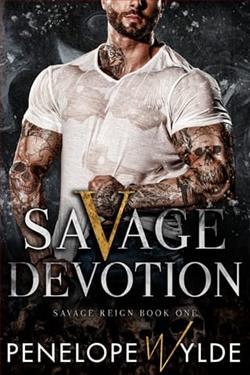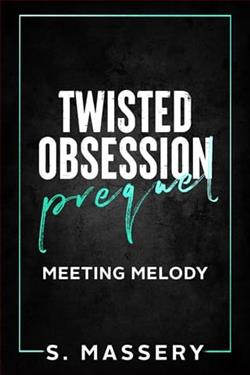Page 39 of The Mafia King's Baby
This is what becoming a criminal looks like, apparently. Not dramatic or obvious. Rather a subtle shift in the way I hold myself, and the way I look at the world.
The clothes Leonid provided are simple but well-made. The jeans fit perfectly, and there’s a soft sweater in dark blue. The underwear is still in the package. He must have had to guess my sizes, but everything fits like it was chosen specifically for me. Is this proof I’m not Yefrem’s first reluctant houseguest?
I fold my dirty clothes into a neat pile, then think better of it and stuff them into the trash can instead. I don’t want anything that smells like that forest, that grave, or that night. It’s better to start fresh with borrowed clothes and try to rebuild some sense of being normal.
The bedroom Leonid showed me earlier is sparse but comfortable, with a double bed with clean sheets, a dresser, and an armless chair by the window that looks out over endless trees. The door has a lock that engages from the inside, and I use it,needing the illusion of privacy and safety even though I know it’s meaningless in a place like this.
I sit on the edge of the bed and try to organize my thoughts, to make sense of everything that’s happened. Two weeks ago, I was unemployed and single and worried about paying my mortgage. Now I’m hiding in a criminal safehouse after helping dispose of a federal agent’s corpse and might never return to my little house and quiet neighborhood. The progression seems impossible, like skipping chapters in a book and trying to follow a plot that no longer makes sense.
But it did happen, all of it, and I need to figure out what comes next.
I wish I could call Gemma to talk it over with her, but that wouldn’t be safe. It hits me that I might never see her again, and that thought hurts. We’ve been friends for two years, but we’re not close enough that she’ll never stop looking for me. Like Mrs. Patterson, she’ll be upset at my disappearance, but it won’t ruin her life or leave her in anguish like it will my mother if I can never speak to her again.
What if I can’t ever go home? The thought makes me vaguely ill, and I have to push it back or risk breaking into tears.
The compound is larger than it appeared from the outside, built into the hillside with multiple levels and more rooms than I bothered counting during Leonid’s brief tour. I remember solar panels, satellite dishes, and enough generators to power a small town. Someone spent serious money making this place completely self-sufficient.
I find Yefrem in what Leonid called the study, though it looks more like a war room with maps on the walls, multiple computerscreens, and communication equipment that looks like it belongs in a government facility rather than a private residence. He’s sitting at a desk reviewing papers, and he doesn’t look up when I enter.
“Feel better?”
“Cleaner.” I close the door behind me and claim the chair across from his desk. “More human.”
He sets down the document he was reading and really looks at me for the first time since we arrived. “You look better.”
“I still look like someone who just helped bury a body and drove three days to hide in a criminal’s compound.”
“That’s exactly what you look like.” His response carries a hint of dark humor. “But better than you looked twelve hours ago.”
I study his face, noting the fatigue lines around his eyes, and the way his shoulders curve inward like he’s carrying invisible weight. He looks older than he did in my kitchen and more worn down by circumstances that haven’t touched me yet.
“I need answers.”
He leans back in his chair, and I catch a glimpse of the man who rented my guest room—polite, careful, and charming in a distant way—but that version of him feels like a performance now, something he put on to make me comfortable.
“What kind of answers?”
“All of them. Everything. Why Lang was after you, why that notebook mattered so much, and what I’ve gotten myself tangled up in.” I keep my voice steady, determined not to let him deflect or minimize what I need to know. “The truth.”
He’s quiet for a long moment, considering how much to tell me. I can see him weighing options, calculating risks, and deciding whether honesty serves his purposes better than continued deception. “The notebook is mine.”
I’m not surprised exactly that it isn’t something he stole from Lang, nor evidence of corruption he was trying to expose. That means it’s his notebook of his records for his criminal empire documented in careful detail. “Yours.”
“My operational ledger. Business dealings, trade routes, payments, and contacts.” He opens a drawer and pulls out a similar notebook, this one bound in different leather but clearly part of the same set. “I keep multiple volumes going back years and update them regularly.”
I stare at the notebook in his hands, remembering the pages of encrypted numbers and names I’d tried to decode in my guest room. Even then, I’d been sure they were evidence of crimes. His crimes. “What kind of business dealings?” I sound less interested than I am.
“The kind that require discretion.”
I snort. “That’s not an answer.”
Yefrem sets the notebook on the desk between us, close enough that I could reach for it if I wanted to see what secrets it contains if I hadn’t already. “Import, export, transportation, and security services. Some of it’s legal, and some of it isn’t. My organization doesn’t handle drugs or human trafficking, but we’re open to most other forms of…commerce.”
I’m oddly relieved by that, knowing he has lines he won’t cross even as a criminal. “How much of it isn’t legal?”
“Enough to matter.”
The non-answers are starting to irritate me. I’ve helped him bury a federal agent, driven across the country to hide in his fortress, and given up any chance of returning to my normal life, at least temporarily. The least he can do is be honest about for what I’ve sacrificed everything. “Stop being evasive. I’ve earned the right to know what I’m mixed up in.”















